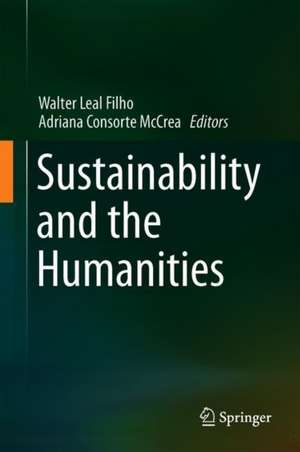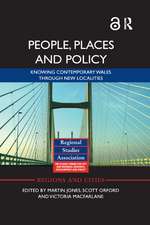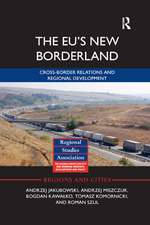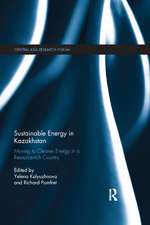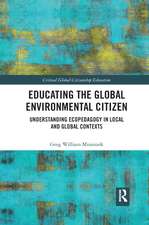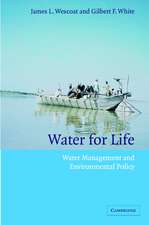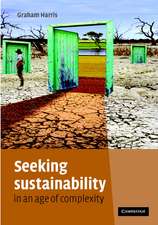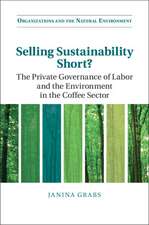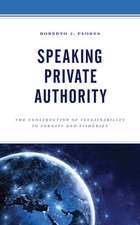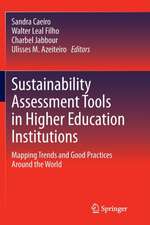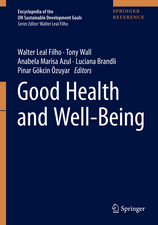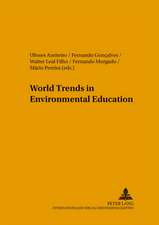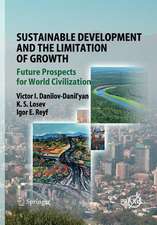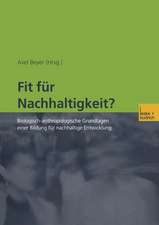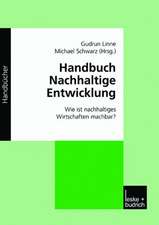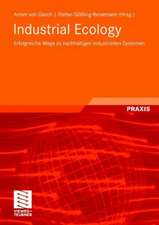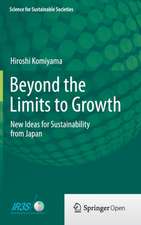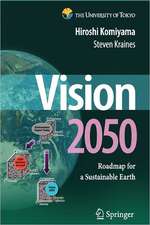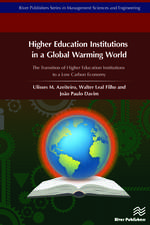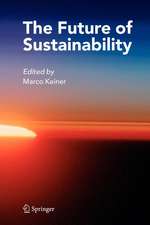Sustainability and the Humanities
Editat de Walter Leal Filho, Adriana Consorte McCreaen Limba Engleză Hardback – 3 sep 2018
- They provide university lecturers interested in humanities and sustainable development with an opportunity to present their work;
- foster the exchange of information, ideas and experiences acquired in the execution of teaching and research; and
- discuss methodological approaches and projects that provide a better understanding of how the humanities can contribute to the debate on sustainable development.
| Toate formatele și edițiile | Preț | Express |
|---|---|---|
| Paperback (1) | 742.49 lei 6-8 săpt. | |
| Springer International Publishing – 3 ian 2019 | 742.49 lei 6-8 săpt. | |
| Hardback (1) | 1021.05 lei 6-8 săpt. | |
| Springer International Publishing – 3 sep 2018 | 1021.05 lei 6-8 săpt. |
Preț: 1021.05 lei
Preț vechi: 1245.18 lei
-18% Nou
Puncte Express: 1532
Preț estimativ în valută:
195.38€ • 201.56$ • 163.04£
195.38€ • 201.56$ • 163.04£
Carte tipărită la comandă
Livrare economică 27 martie-10 aprilie
Preluare comenzi: 021 569.72.76
Specificații
ISBN-13: 9783319953359
ISBN-10: 3319953354
Pagini: 618
Ilustrații: X, 619 p. 76 illus., 54 illus. in color.
Dimensiuni: 155 x 235 mm
Greutate: 1.05 kg
Ediția:1st ed. 2019
Editura: Springer International Publishing
Colecția Springer
Locul publicării:Cham, Switzerland
ISBN-10: 3319953354
Pagini: 618
Ilustrații: X, 619 p. 76 illus., 54 illus. in color.
Dimensiuni: 155 x 235 mm
Greutate: 1.05 kg
Ediția:1st ed. 2019
Editura: Springer International Publishing
Colecția Springer
Locul publicării:Cham, Switzerland
Cuprins
Chapter 1.The Role of Religion in Global Sustainability: A Study on Catalonia’s Contribution to Sustainable Development Goals.-Chapter 2.Myth, Cosmology and the Sacred: Transformative Learning as the Bridge between Worlds.-Chapter 3.Enabling Transformative Urban Development for Integral Sustainability: A Case for Tapping the Potential of Sri Aurobindo's Philosophy in Planning Practice and Theory.-Chapter 4.Sustainability, The Image of God, and The Person of Christ: An Exploration of the Role of The Hypostatic Union for the Sustainability Project.-Chapter 5.Re-coupling Nature and Culture: How can Primary Teacher Educators Enable Pre-service Teachers and Their Pupils to Breathe Life Back into Humanity’s Tin Forests?.-Chapter 6.Is it Possible to Give Environmental Issues A More Prominent Role in Church Life?,-Chapter 7.The Poor Just might be the Educators We Need for Global Sustainability - A Manifesto for Consulting the Unconsulted.-Chapter 8.Religious Organizations Bringing Sustainability Closer to Reality: Academic Contributions to Environmental Sustainability and Climate Resilience that can Help Faith Leaders Build Communities that are Environmentally, Socially and Economically Sustainable: Part 1 - A Literature Review.-Chapter 9.The Roots Project Student Sustainability, Wellbeing and Global Citizenship.-Chapter 10.Transitioning to Sustainable Food Choices: A Course Design.-Chapter 11.Terra Two: An Ark for Off-World Survival—A York St John University Project on Sustainability, Spirituality, and Science Fiction.-Chapter 12.Sustaining Theology: Personal Search to Public Research: Bible to Bibliography.-Chapter 13.Exploring the Pentecostal Faith – Sustainability – Entrepreneurship Nexus in Zimbabwe.-Chapter 14.Examining Evidence of How A Culture Values Nature, Particularly its Spiritual Value.-Chapter 15.Approaches for the Implementation of Water-Related Cultural Ecosystem Services in Teaching Programs on Sustainable Development.-Chapter 16.Towards an Integrated Disciplinary Narrative and an Enhanced Role for Geography in Education for Sustainability: Reflections on South African Higher Education.-Chapter 17.Conjuring A ‘Spirit’ for Sustainability:A Review of the Socio-materialist Effects Of Provocative Pedagogies.-Chapter 18.Engaging Intuition and Imagination for Solutions To Confounding Science and Societal Problems.-Chapter 19.Re-thinking Economics in A Circular Way in the Ligh of Encyclical “Laudato Si”.-Chapter 20.Contemplative Sustainable Futures: The Role of Individual Inner Transformation in Sustainability Research and Education.-Chapter 21.Sustained by Faith? The role of Christian Belief and Practice in Living Sustainably.-Chapter 22.Transformative Education for Sustainability, Health and Wellbeing; A Model of Online Delivery.-Chapter 23.Sustainably Sourced Seafood: A Criminological Approach to Reduce Demand for Illegal Seafood Supply.-Chapter 24.Sustaining Human Food Sources by Using Abrahamic Religious Guidance as a Framework for their Sustainable Production and Consumption.-Chapter 25.Systematic Thinking as a Factor in Implementing Sustainable Development.-Chapter 26.Taking Sustainability to Heart – Towards Engaging with Sustainability Issues Through Heart-Centred Thinking.-Chapter 27.The Evolution of Societal Values: A historical Perspective of the Role of Sustainability in the Practice of Economics.-Chapter 28.Religion and the Environment: An Exploration of the Connections Among the Hindu and Christian Community in the Republic of Mauritius.-Chapter 29.What Can we Learn from Pope Francis about Change Management for Environmental Sustainability? A Case Study on Success Factors for Leading Change in Change Resistant Institutional Environments.-Chapter 30.Law’s Ethics and Sustainability: Corporate Tax and Sustainable Social Structures.-Chapter 31.A Model for Integrating Spirituality in Social Development in Latin America: Exploring Pope Francis Encyclical Letter Laudato Si (On Care for Our Common Home), the Ecology ofLiberation and the Ancestral Wisdom of the South American People.-Chapter 32.Shepherding Sustainable Development: Possible Lessons on Leadership from Judaism and the Early Christian Church.-Chapter 33.Humanism and Business: The Case of a Sustainable Business Experience in the Florentine Tourist Sector Based on the Civil Economy Tradition.-Chapter 34.Sustainability Values in the Legacy of St George Preca: Society of Christian Doctrine Women’s Experiences.-Chapter 35.Sustainability and Religion: Past Trends and Future Perspectives.
Notă biografică
Professor Walter Leal Filho (BSc, PhD, DSC, DPhil, DL, DEd, DLit) is a professor at Hamburg University of Applied Sciences in Germany, and at Manchester Metropolitan University, UK. He is the founding director of the World Sustainable Development Research and Transfer Centre, a recently created centre aimed at supporting the implementation of the UN Sustainable Development Goals. He has nearly 30 years experience on matters related to sustainable development, and has over 400 publications to his credit.
Textul de pe ultima copertă
This book explores the strong links between sustainability and the humanities, which go beyond the inclusion of social sciences in discussions on sustainability, and offers a holistic discussion on the intellectual and moral aspects of sustainable development. The contributions from researchers in the fields of education, social sciences, religion, humanities, and sustainable development fulfill three main aims:
- They provide university lecturers interested in humanities and sustainable development with an opportunity to present their work;
- foster the exchange of information, ideas and experiences acquired in the execution of teaching and research; and
- discuss methodological approaches and projects that provide a better understanding of how the humanities can contribute to the debate on sustainable development.
Caracteristici
Explores the importance of the interactions between the humanities and sustainability Gathers contributions from experts from education, the social sciences, theology, the broader humanities, and sustainable development Provides a new perspective that aids efforts toward environmental and human sustainability
